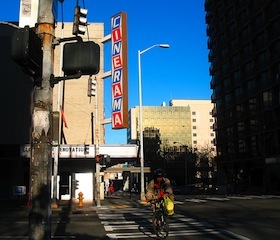 The Seattle Cinerama Theatre, in Seattle, Washington has purchased the world’s first commercial digital laser projection system. Christie, who recently received the first US FDA approval of variance allowing the sale of laser projectors for use in a cinema, will install a 4K Christie digital laser projector, with scalable light output up to 60,000 lumens.
The Seattle Cinerama Theatre, in Seattle, Washington has purchased the world’s first commercial digital laser projection system. Christie, who recently received the first US FDA approval of variance allowing the sale of laser projectors for use in a cinema, will install a 4K Christie digital laser projector, with scalable light output up to 60,000 lumens.
“When hi-tech visionary Paul G. Allen bought the theater in 1999, he gave Cinerama full rein to innovate in order to provide our community with a cutting-edge movie going experience,” said Cinerama Theatre manager Greg Wood. “Selecting a laser projection solution – with its ability to render 2D and 3D movies with stunning clarity and brilliant, accurate color rendition – is in keeping with this tradition. We were excited by demonstrations of the technology earlier this year by Christie and we are looking forward to welcoming this reliable and brilliant laser projector installation to our space.”
Jack Kline, president & COO, Christie Digital Systems USA said, “Cinerama has a long history of innovation and our latest projector will empower the theatre to take the audience experience to the next level. A laser projector is a significant investment for any cinema and the fact that the Seattle Cinerama has chosen Christie to help this venue continue in its capacity as one of the world’s premiere movie theaters is a great vote of confidence.”
Site scoping and technical evaluations will begin this month, with an anticipated switch over from conventional digital projection to the latest Christie digital cinema laser projector planned for early next year.
Dr. Don Shaw, senior director, product management, Christie Entertainment Solutions said, “Cinerama’s huge screen requires the best and brightest in digital cinema projection technology, so it can demonstrate how spectacularly a moviemaker’s vision can be realized when shown at high contrast ratios and intense light levels. This in turn will yield an entirely new and naturally immersive experience for the average moviegoer and aficionados alike. We know that Christie laser projection will deliver beyond everyone’s already-high expectations.”
Christie has a history of innovation without equal in the cinema technology world. For example, most recently and for two full weeks beginning March 28, 2013, Christie joined forces with AMC and Paramount Pictures to project G.I. Joe: Retaliation in the first commercial exhibition of a 3D movie at brightness levels of 14 foot lamberts using laser projection. It was the first ever opportunity for the general public to enjoy compelling, immersive 3D images delivered at 2D light levels.
In 2012 Christie showed select exhibitors in Asia how 72,000 lumens could be achieved, in a demonstration of its prototype laser projector in Beijing. That screening followed the September showing at IBC 2012 in Amsterdam of Hugo 3D – the first Cameron Pace Group certified movie – which was introduced by Shaw, along with noted stereographers, Demetri Portelli and Corey Turner (Transformers: Dark of the Moon). The movie was then projected using Christie’s 4K laser projector prototype.
Christie hosted its first laser projector demo for cinema industry luminaries including Douglas Trumbull, Gordon E. Sawyer Academy Award winner, at its High Frame Rate Summit held in its manufacturing and engineering headquarters in Kitchener, Ontario in April 2012.
Christie intends to introduce a wide range of laser projectors building on core technologies and architectures, to power applications for the digital cinema, pro AV, visualization and simulation markets, throughout 2013 and beyond.
When Allen heard in the mid-1990s that Seattle's historic Cinerama Theatre might close down to become a rock-climbing club, dinner theater, or even a parking lot, he signed a Save the Cinerama petition—and later took it a step further by purchasing the old movie-house himself. Seattle's Cinerama Theatre was one of many opened in the 1950s and 1960s for Cinerama films, technological marvels of their day, which were shown on a curved screen utilizing a three-projector system.
In 1998, Vulcan kicked off a major, multi-million dollar renovation of the theatre, refurbishing the interior and exterior, installing state-of-the-art sound and projector systems, and ensuring maximum accessibility for mobility- and sensory-impaired patrons. A grand re-opening celebration took place on April 22, 1999 to welcome the theatre back into commission. Since then, it has regularly been voted one of Seattle's best places to watch a movie and plays host to various film festivals and blockbuster film premieres each year.
Christie Digital Systems USA www.christiedigital.com
